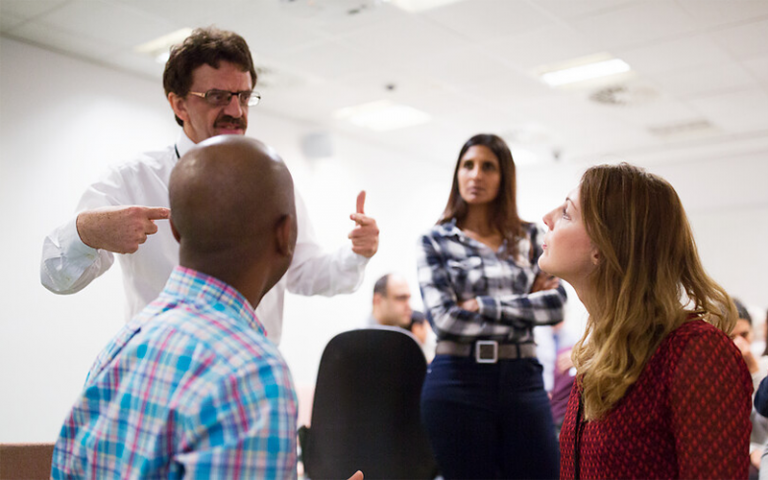Multimodal communication in native and second language
12 December 2022, 6:00 pm–7:30 pm

Join this event to hear Professor Gabriella Vigliocco discuss multimodal communication.
This event is free.
Event Information
Open to
- All
Availability
- Yes
Cost
- Free
Organiser
-
Roberto Filippi
Language is learnt and used, for the most part, in face-to-face contexts in which the comprehender has access to the speech, but also to multimodal cues such as hand gestures and facial movements. All these different aspects of face-to-face communication are processed by comprehenders at the same time, however, most of what we know about how we understand language has come from the study of speech only, neglecting the other co-occurring non-linguistic behaviours always present in face-to-face communication.
In this event, Gabriella will describe a series of studies that investigates when the different aspects of communication (the words, their intonation, the gesture speakers’ produce and their facial movements) are processed in the brain of native and non-native comprehenders.
She will explain that non-linguistic information is processed at the same time as we extract meaning from words in discourse and, that the different multimodal cues all contribute to comprehension. Moreover, she will highlight that both native and non-native comprehenders process audiovisual language in similar manners, although there are some important differences.
This event will be particularly useful for those who want to learn more about sign language and multimodal communication.
Multilingualism and Diversity: Impact on Education, Health and Society seminar series
This seminar series aims to bridge science with practice in education. Leading experts in linguistics, psychological sciences and neurosciences will engage with education practitioners, parents, students and members of the public who have an interest in multicultural diversity and inclusion.
Related links
About the Speaker
Professor Gabriella Vigliocco
Professor of the Psychology of Language at UCL
She is the Director of the Language and Cognition group at UCL and of the Leverhulme Doctoral Programme for the Ecological Study of the Brain at UCL. She is a fellow of the Cognitive Science Society and of the Association for Psychological Sciences. Her research concerns psychological and neural mechanisms underpinning human language with a special emphasis on how language allows us to communicate, and learn about the world.
Gabriella has contributed to and led a shift in the fields of Psychology, Neuroscience and Linguistics from studying language as a symbolic capacity, evolved, learnt and used separately from the rest of human cognition, to one in which language is grounded in basic sensorimotor functions and that needs to be studied in its ecological niche. She uses methods from psychology, neuroscience and computational modelling and seeks converging evidence from different languages and populations: adults, children, deaf individuals using sign language, and people with aphasia.
More about Professor Gabriella Vigliocco Close
Close

